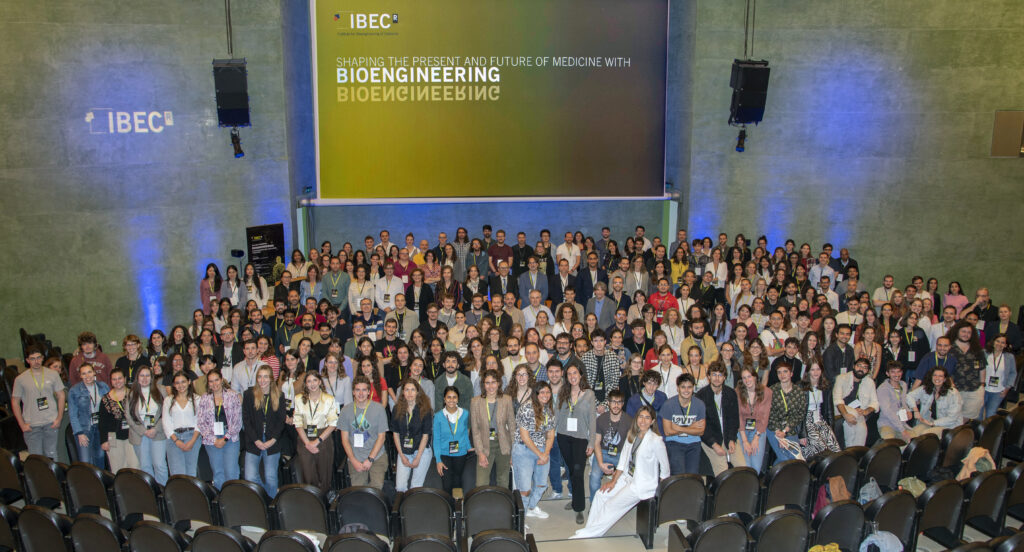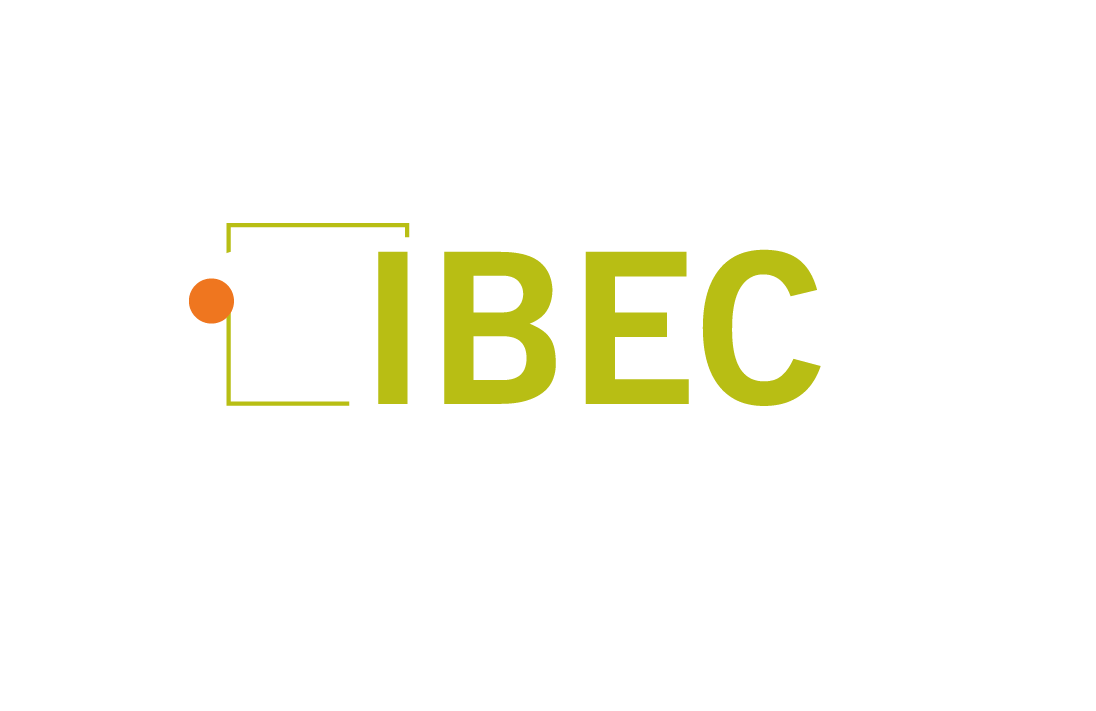18th IBEC SYMPOSIUM
Bioengineering for precision medicine
October 16th and 17th · Barcelona
The 18th IBEC annual Symposium brings together high-profile international experts for an open forum for interdisciplinary discussions and networking. This year the symposium is dedicated to Bioengineering for precision medicine, one of IBEC’s three major application areas.
All scientific community is invited to participate. Attendees from IBEC and abroad are welcome to present their research or projects in poster format. Moreover, some of these contributions will be selected by the scientific committee for an oral flash presentation.
This year, the Symposium will also have a day exclusively dedicated to posters. The 16th of October the Symposium will be celebrated at the AXA Auditorium. The poster session will be celebrated the day after, 17th of October at Sant Pau Recinte Modernista.
Important deadlines 2025:
Abstracts submission deadline: July 25th Notification of acceptance: September 10th Registration deadline: October 1st
venue:
Symposium:
16th October
Auditori L’Illa, Av. Diagonal, 547, Barcelona
Poster session:
17th October
Sant Pau Recinte Modernista
INVITED speakers
Speaker Presentation Template
Download the template here:
2025_IBECSymposium_Plantilla_Compressed
Scientific Poster Template
Download the template here:
Day 1 – October 16
| 08:00 – 09:00 | Registration |
| 09:00 – 09:15 | Opening ceremony |
| 09:15 – 09:45 | Director’s presentation |
| 09:45 – 10:20 | Melike Lakadamyali · University of Pennsylvania Selected ICREA Professor 2025 Super-resolution imaging of chromatin structure in health disease |
| 10:20 – 11:00 |
Flash presentations. Session 1
|
| 11:00 – 11:35 | Coffee break |
| 11:35 – 11:55 | Alumni session: Alejandro Torres-Sánchez · EMBL Barcelona |
| 11:55 – 12:30 | Evrim Acar Ataman · Simula Research Laboratory (Coupled) Tensor Factorizations – as a tool to develop knowledge-guided data-driven methods for extracting insights from complex data |
| 12:30 – 13:15 | Session on Translation Round table: Irene Marco-Rius (Vitala Technologies), Samuel Ojosnegros (Lumiris Spectral Solutions) and Samuel Sánchez (Nanobots Therapeutics). |
| 13:15 – 14:30 | Lunch break |
| 14:30 – 15:25 |
Flash presentations. Session 2
|
| 15:25 – 16:00 | Yuval Ebenstein · Tel Aviv University Selected ICREA Professor 2025 From the Lab to the Clinic: A toolbox for epigenetic analysis of DNA |
| 16:00 – 16:10 | Marc Riu · PhD Committee |
| 16:10 – 16:20 | Laasya Dhandapani · Postdoc Committee |
| 16:20 – 16:30 |
Awards and closing ceremony
|
Day 2 – October 17
| 10:00 – 12:30 | Poster Session |
REGISTRATION
At this year’s Symposium the poster sessions will be electronic – No need to print or to stand around your poster for hours.
With the innovative e-poster format the posters will be displayed on plasma screens and everyone will be assigned a time slot to present it in front of the interested audience.
Registration for the symposium is closed. For further information, please contact: ibeccommunications@ibecbarcelona.eu
PREVIOUS EDITIONS
17th IBEC Symposium · 2024 Bioengineering for Emergent and Advanced Therapies
IBEC’s 17th Annual Symposium focused on Bioengineering for Emergent and Advanced Therapies, one of IBEC’s core application areas. Held on 22 October at the AXA Auditorium, the event brought together around 300 participants, including both local and international researchers, in a multidisciplinary environment designed to promote knowledge exchange and networking. The Symposium provided a platform for members of IBEC and external institutions to present their latest projects and foster collaboration. The afternoon prior, 21 October, featured a dedicated poster session at Citilab, reinforcing the symposium’s commitment to open, accessible science.

Opening and Welcome
The event began with a welcome by Gal·la Vinyes and Janet van der Graaf, researchers from IBEC’s Nanobioengineering and Integrative Cell and Tissue Dynamics groups, who acted as Masters of Ceremony.
Representatives from IBEC’s founding institutions also delivered opening remarks, including:
- Laia Arnal, Director General for Knowledge Transfer and Society, Government of Catalonia
- Jordi Llorca, Vice-Rector for Research, UPC Joan Guàrdia, Rector, University of Barcelona
- Josep Samitier, Director, IBEC Josep Samitier opened the scientific programme with an overview of IBEC’s annual achievements and future strategy.
Scientific Presentations
The Symposium featured presentations by leading international researchers in biotechnology for new and advanced therapies:
Valentina Basoli (University of Basel, Switzerland) showcased the use of 3D printing for bone and cartilage regeneration and highlighted the role of biosensors in monitoring cellular behavior.
- Twan Lammers (RWTH Aachen University, Germany) discussed strategies to enhance the clinical translation of nanomedicine for cancer, including image-guided drug delivery and the use of biomarkers.
- Veronica Hortigüela, an IBEC alumna and pharmaceutical industry professional, shared her personal journey from academia to industry.
- Tae-Eun Park (National Institute of Science and Technology, Ulsan, South Korea) presented a microphysiological system mimicking the blood-brain barrier to support targeted drug delivery.
Additionally, Pere Roca-Cusachs, Deputy Director of IBEC’s Intramural Scientific Programme, introduced the Institute’s Thematic Networks, designed to enhance collaboration between IBEC research groups.
Recognition and Awards
The Symposium also served to celebrate IBEC’s recent Severo Ochoa Centre of Excellence accreditation—awarded for the third consecutive time.
Present for the occasion was Núria Montserrat, former IBEC director and current Catalan Minister for Research and Universities, who quoted Severo Ochoa: “Science is always worth doing because sooner or later the discoveries will have an application.”
Awards and recognitions included:
Doctoral Excellence Certificates:
- Celia Ximenes and Marina Martínez (Biomaterials for Regenerative Therapies)
- Shubham Tanwar (Nanoscale Bioelectrical Characterisation)
- Meritxell Serra (Smart nano-bio-devices) – Winner of the IBEC Doctoral Prize for her thesis on nanobots for cancer therapy
Best Poster Award: Pau Guillamat (Integrative Cell and Tissue Dynamics group) for “Guidance of cellular nematics into self-shaping active surfaces”
Best Dissemination Award (secondary school outreach activity): David Bartolomé Català (Biomimetic Systems for Cell Engineering group)
Best Quick Presentation Award: Karolina Zimkoswka (Molecular and Cellular Neurobiotechnology group) for her 5-minute talk on: “Monitoring neuronal activity in human cortical organoids with FTLD-tau” The Quick Presentation format featured 20 brief talks across four key themes: cell engineering, mechanobiology, ICT for health, and nanomedicine.
Engaging the Community
In addition to the scientific programme, a special outreach activity for secondary school students was organised. Twenty IBEC researchers pre-presented their posters in an adapted, student-friendly format. The students then voted for their favourite, helping to bridge the gap between research and public understanding.
